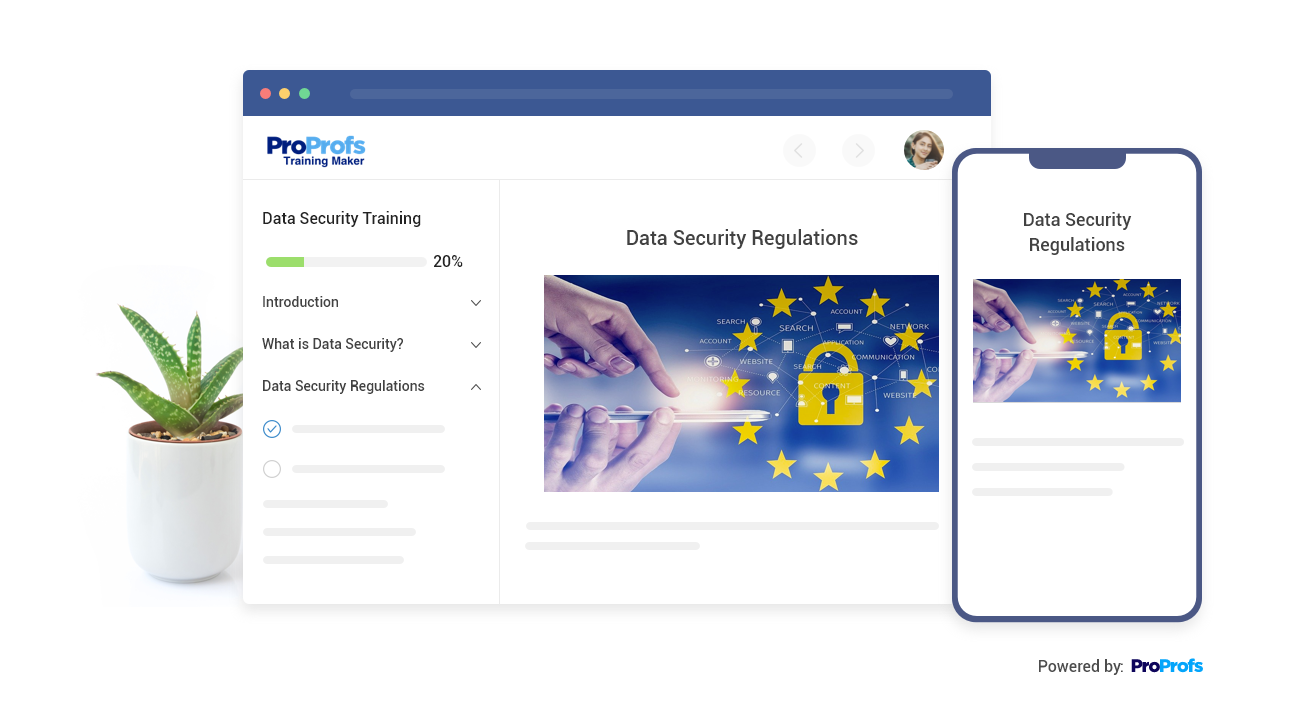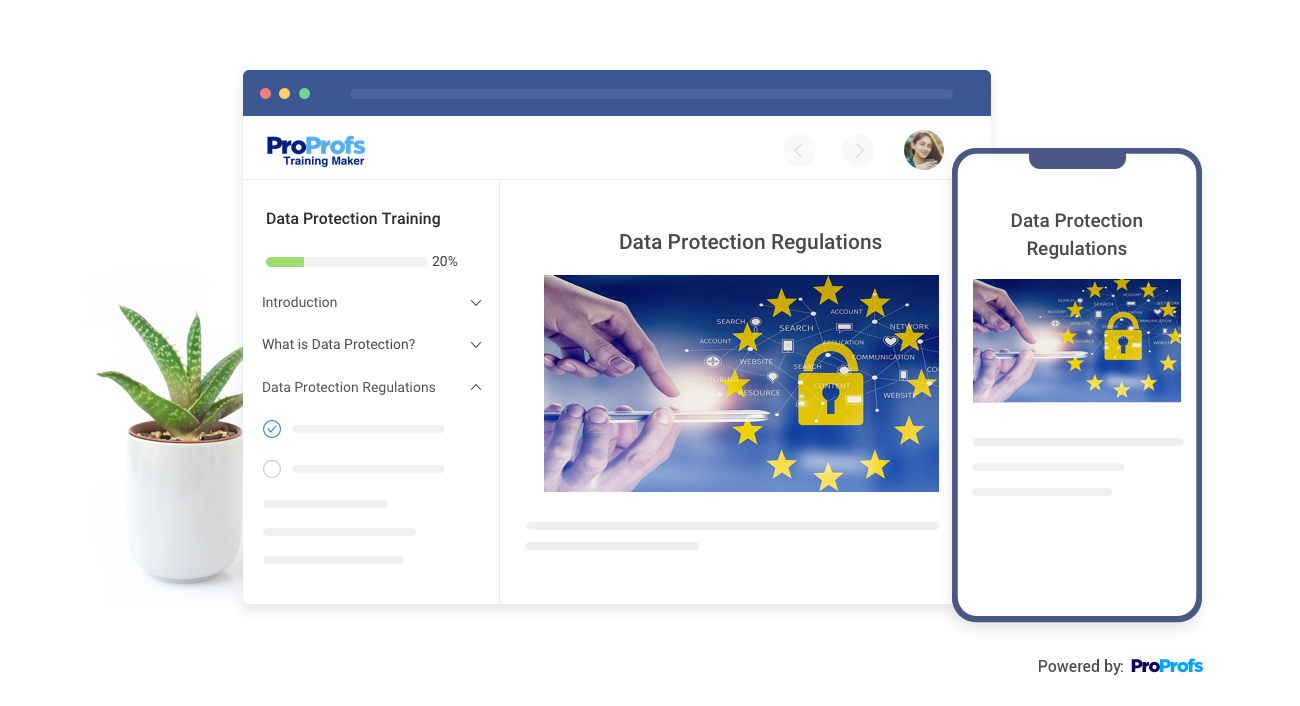Data privacy training for employees is key to creating awareness about the importance of protecting confidential and sensitive information.
With the right privacy awareness training, you can empower employees to prevent data breaches and contribute to a secure and compliant organization.
Data privacy breaches can lead to devastating consequences, including financial losses, reputational damage, and even legal action.
I have created this post to help you understand the importance of training your employees on this topic. Also, I have listed the best data privacy awareness courses that you can incorporate into your training programs.
What Is Data Privacy Awareness Training?

Data privacy awareness training is an educational course and program that aims to teach employees about the importance of protecting sensitive information, the laws and regulations that govern data privacy, and the best practices and procedures that a company can follow to ensure compliance and security.
Such training can help employees understand the risks of data collection and surveillance, the ethical and legal implications of personal data, and the responsibilities and roles of different stakeholders.
This employee training helps develop the skills and knowledge to handle data breaches, privacy requests, and data protection audits.
Why Is Data Privacy Training Important for Employees?
Imagine you’re walking down the street, carrying a bag full of valuable possessions.
Would you carelessly leave it unattended or entrust it to someone you don’t know?
Data is like that bag of valuables, and our employees are the ones entrusted with its safekeeping.
Here are five reasons why data privacy training is important for employees:
1. Empowers Employees With the Right Knowledge
Data privacy training empowers employees with the knowledge and skills they need to protect personal information and prevent data breaches. This can make employees feel more confident and responsible in their jobs.
This includes knowledge of various data protection laws and regulations, understanding the types of data that need to be protected, and the potential risks and consequences of data breaches.
Privacy awareness training for employees involves practical skills such as recognizing phishing attempts, using secure passwords, and knowing how to respond in the event of a data breach. With this knowledge, employees can make informed decisions about data handling, ensuring they can protect both the company and its customers.
In essence, the right kind of knowledge turns employees into the first line of defense against data breaches, enhancing the overall security of an organization.
2. Protects Personal Information
By 2024, 75% of the global population will have their personal data covered under privacy regulations. This shows the growing recognition of the importance of data privacy.
Every day, you collect a lot of personal information about your customers, employees, and partners. This information includes names, addresses, phone numbers, Social Security numbers, and more.
So, it’s your responsibility to protect this information and make sure it doesn’t fall into the wrong hands.
With data privacy training, you can help employees realize the importance of data privacy and ways to protect it from unauthorized access.
Through privacy awareness training, employees learn about data security practices, teaching employees to identify and mitigate potential threats. Also, they get to understand the various types of data breaches, their modus operandi, and the devastating consequences for individuals, organizations, and society.
3. Prevents Data Breaches
Data breaches are a major concern for businesses of all sizes.
A data breach can cost a company millions of dollars in fines, legal fees, and lost business.
In a troubling development, a massive data breach affected millions of users of the popular ancestry website 23andMe. The breach, which is one of the largest in recent history, exposed the personal information of approximately 6.9 million users.
This sensitive data included users’ display names and their detailed ancestry reports.
In the wake of the breach, 23andMe came under intense scrutiny. The company has been criticized for its handling of the incident and for its failure to protect its users’ data adequately.
That’s exactly why data privacy and awareness training is so essential.
It can help prevent data breaches by teaching employees how to identify and avoid common risks. By educating employees about the various types of data breaches, their potential consequences, and the methods used by cybercriminals, organizations can significantly reduce their vulnerability to these attacks.
4. Ensures Compliance With Regulations
There are a growing number of data privacy laws and regulations worldwide. These laws and regulations are designed to protect the privacy of individuals.
- The Federal Trade Commission Act (FTC Act) gives the FTC the power to take action against businesses that engage in unfair or deceptive practices, including those that violate privacy or data protection laws.
- The Fair and Accurate Credit Transactions Act (FACT Act) and the Fair Credit Reporting Act (FCRA) set standards for how credit information must be handled. Businesses that violate these laws can face penalties.
- The Americans with Disabilities Act (ADA) and other privacy laws, such as the California Consumer Privacy Act (CCPA), regulate how personal information is collected and used.
- The EU-US Privacy Shield Framework is a set of standards that U.S. companies can voluntarily comply with to ensure that they are transferring personal data to the EU in a lawful way.
Employee data privacy training helps understand these laws and regulations and how to comply with them.
Without proper training, employees may inadvertently violate these laws, putting the company at risk of reputational damage, legal action, and loss of customer trust. Plus, data privacy breaches can result in significant financial penalties, particularly under the GDPR.
5. Enhances Customer Trust
Customers are increasingly concerned about how their personal information is being used.
A recent study by McKinsey & Company surveyed 1,000 North American consumers to gauge their perceptions of data collection, breaches, regulations, and trust in businesses.
The findings reveal that consumers are very selective and conscious about the types of data they share and with whom they share it.
Significantly, the study found that consumers are more inclined to share personal data when it is essential for their interactions with organizations. By industry, consumers expressed greater comfort in sharing data with healthcare and financial services providers.
However, no industry achieved a 50% trust rating for data protection. This lack of trust is understandable, given the recent spate of high-profile consumer data breaches.
The study concludes that data management practices can become a differentiator for companies, even a competitive advantage. This underscores the importance of handling customer data responsibly to foster trust.
Data privacy training can help reassure customers that their data is being handled responsibly. This can help build loyalty and trust among customers.
Protect Your Employees & Organization
Deliver impactful data privacy training today.
5 Data Privacy Training Courses
Here are some of the best data privacy training courses that you can use for employee training.
I have been able to transform my team’s approach to data privacy through these courses.
Today, we handle sensitive data with confidence and assurance, knowing we are upholding the highest standards of data privacy.
This transformation has not only improved our operations but also earned the trust of our clients.
1. Data Security Training
The “Data Security Training Course” is designed to safeguard data against modern threats and AI-driven attacks.
Today, cybersecurity threats like malware, phishing, and increasingly AI attacks, are not just prevalent but also highly sophisticated.
This data privacy awareness training discusses the most pressing security threats of our time with real-world scenarios, informative handouts, and rigorous assessments to test and reinforce knowledge.
It emphasizes that protecting sensitive data is not just about preventing unauthorized access; it’s about ensuring trust, maintaining reputation, and complying with global regulations.
This course is a valuable resource for any organization looking to stay ahead in the security game.
2. General Data Protection
The next course I would suggest is the “General Data Protection Regulation (GDPR) Training Course”. This course is crucial for any organization looking to ensure ongoing compliance and know what to do in cases of data privacy violations.
With this course, you can train employees on the ways to protect personal data and ensure compliance with GDPR.
This course delves into the fundamental principles of the regulation and provides a framework for evaluating its applicability in various scenarios.
Upon completing the course, you will gain a comprehensive understanding of the historical context of data privacy, the core tenets of data protection, the rights of individuals with respect to their data, and the appropriate course of action in the event of non-compliance.
3. Data Protection Training

The next topic I would suggest for your training program is the “Data Protection Training Course.”
This comprehensive module covers crucial aspects of data protection, such as understanding regulations, identifying common threats, and implementing effective safeguards.
In the face of the alarming rise in data breaches in recent years, this course equips employees with practical steps to prevent security incidents.
The inclusion of interactive quizzes in each chapter ensures a thorough understanding of the material, and the accompanying feedback form fosters engagement.
By integrating this course into your training program, you can actively strengthen your organization’s data security and build a culture of responsible data handling among your teams.
4. Phishing Awareness Training
Did you know that 90% of security breaches in businesses are caused by phishing?
That’s unnerving, isn’t it?
Phishing is a sneaky way of tricking people into giving away sensitive information or access to systems. You must train your employees on how to protect themselves from this social engineering.
This online course not only educates employees on various types of phishing but also equips them with practical tips to identify and respond to different phishing attacks.
With relatable scenarios and end-of-chapter assessments, this course provides a comprehensive understanding of phishing, making it an essential component in your efforts to ensure data security and privacy.
5. Security Awareness Training
This course is essential for cultivating a safe workplace by providing formal security education on personal device security, password usage, phishing attacks, handling suspicious URLs, social engineering, and preventing data leakage.
It covers a broad spectrum of security and privacy issues, offering practical tips for staying safe online.
With topics ranging from workplace security to cyber security, With topics ranging from workplace security to enterprise cyber security, this course ensures that employees are well-versed in maintaining a secure work environment.
How to Create & Deliver Data Privacy Training
To create the best program for data privacy training, you can use an LMS such as ProProfs Training Maker. Here are the steps to create and deliver effective data privacy training:
Step 1: Understand the Basics of Data Privacy
Before creating a training program, it’s important to understand the basics of data privacy. This includes understanding various data protection laws and regulations, such as GDPR, CCPA, etc.
Step 2: Define Your Training Goals
Identify what you want your employees to learn from this training. The goal could be to make them aware of data privacy laws, teach them how to handle sensitive data, and so on. No matter what the goal is, it should be specific, measurable, attainable, realistic, and time-bound.
Step 3: Create Your Course
There are two ways to create a course – using pre-made templates and courses or you can build it from scratch. You can add various types of content like text, images, videos, quizzes, etc. Make sure the content is engaging and easy to understand.
Step 4: Add Real-Life Scenarios
To make the training more effective, add real-life scenarios and case studies. This will help employees understand the importance of data privacy and how to handle data in real-life situations.
Step 5: Test Knowledge With Quizzes
Add quizzes at the end of each module to test the knowledge of your employees. This will also help you identify areas where more training might be needed.
Step 6: Share the Course
Once your course is ready, you can share the course via email, social media, SMS, QR code, etc. Since you can deliver the training online, your employees can complete the training at their own pace.
Use the reporting feature to track the progress of your employees. Provide feedback and additional support to employees who might be struggling with the training. For feedback collection, you can try out this survey maker.
Remember, the key to a successful data privacy training program is to make it engaging and relevant to your employees.
Here’s a quick video on how to make your training engaging: How to Add Media to Your Online Courses
Last but not least, regularly update your training program to reflect any changes in data privacy laws and regulations.
Good luck!
Get Free Employee Training Software — All Features, Forever.
We've helped 567 companies train 200,000+ employees. Create courses in under a minute with our AI LMS or use 200+ ready-made courses on compliance, harassment, DEI, onboarding, and more!
Empower Your Employees with Data Privacy Training
By investing in data privacy training for employees, organizations can empower their workforce to safeguard sensitive information, mitigate data breaches, and contribute to a secure and compliant organizational environment.
The benefits of data privacy training are manifold, from preventing financial losses and reputational damage to fostering customer trust and enhancing competitive advantage.
With the right training, organizations can create a culture of data privacy that protects their most valuable assets – their data and reputation.
 Tips
Tips
We’d love to hear your tips & suggestions on this article!
Get Free Employee Training Software — All Features, Forever.
We've helped 567 companies train 200,000+ employees. Create courses in under a minute with our AI LMS or use 200+ ready-made courses on compliance, harassment, DEI, onboarding, and more!

 We'd love your feedback!
We'd love your feedback! Thanks for your feedback!
Thanks for your feedback!







